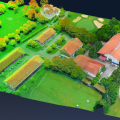
Dialog Information Technology and Thermopylae Sciences + Technology recently announced that Dialog has been chosen as the first Australian & New Zealand partner for the Thermopylae framework solutions, iSpatial, iHarvest and Ubiquity.
iSpatial is a geo-visualisation framework that lets organisations easily build web-based solutions to author, manage, share, and collaborate on geospatial information within their enterprise over the browser-based Google Earth 3D plug-in or 2D Google Maps.
Ubiquity is a mobile application framework that allows organisations and their users to build native mobile applications on the fly via a Web-based interface, and then manage the functionality inside the app once it is distributed to users. Ubiquity applications can be integrated with iSpatial to support tracking and bi-directional chat, file transfer and a range of other collaboration scenarios.
Finally, the iHarvest Intel service can model user activity on a system, then use those models to perform analysis on the system. Possible uses include connecting users to other similar users, make recommendations on data that might interest them, alert them of new data entering the system that matches their model, and various forms of system monitoring.
Dialog is pleased to introduce these frameworks to the Australian and New Zealand Market, and will provide implementation and integration services to customise clients’ needs on top of these platforms.
National Practice Manager for Google Enterprise, Glenn Irvine said, “There is a strong interest for the Thermopylae frameworks in the Defence, Intelligence, Engineering, Emergency Services and Policing sectors in the ANZ Market. These award winning frameworks on top of Google’s proven Geospatial and mobile platforms provide scalable, secure solutions that combine location and mobility for powerful situational awareness tools.”
Key customers include: U.S. Southern Command (SOUTHCOM), U.S. Department of State (DoS), U.S. Defense Intelligence Agency (DIA), U.S. Agency for International Development (USAID), U.S. Army Intelligence and Security Command (INSCOM), Federal Energy Regulatory Commission, US Postal Service, and Oil & Gas Companies.







